Can Hamsters Eat Snow Peas?
As herbivorous organisms, hamsters eat fruits, vegetables, and grains. To be fit and resistant to several illnesses, they need nutritious food. One question that many pet owners ask is, Can Hamsters Eat Snow Peas?
The short answer is yes, hamsters can eat snow peas in moderation but with a few important cautions.
Snow peas are also known as Chinese peas or sugar snap peas. They are a type of legume. They are a healthy addition to a hamster’s diet. Peas are high in fiber, vitamins, and minerals. Still, it is important to remember that a hamster’s diet should not consist entirely of snow peas.
Everything you must know about all kinds of hamster nutrition, even how secure and healthy it is to offer your pet snow peas, is given in this article.
Are Snow Peas Safe for Hamsters?
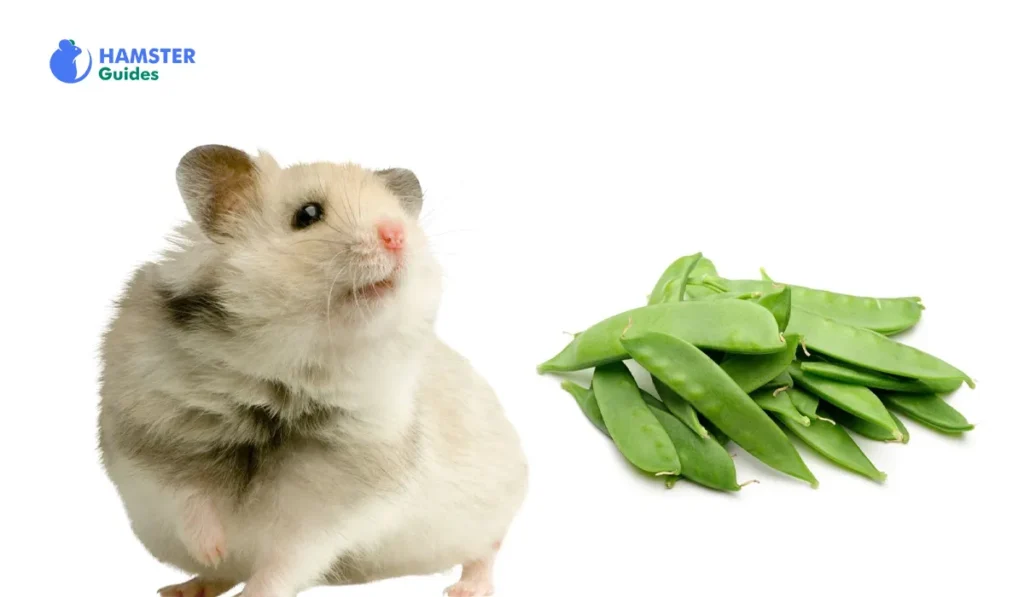
Snow peas are a nutritious source that hamsters can eat in proportion. But if consumed in small quantities. This crunchy vegetable provides your pet with all the necessary nutrition it requires. They are high in nutrients and vitamins.
The Nutritional Facts of Peas for Hamsters
A hamster’s diet must contain lots of vegetables. Mostly because they are omnivores by nature. Their overall wellness requires it. Peas give many health benefits to our little pets whether they are snow peas, sugar snap peas, or garden peas.
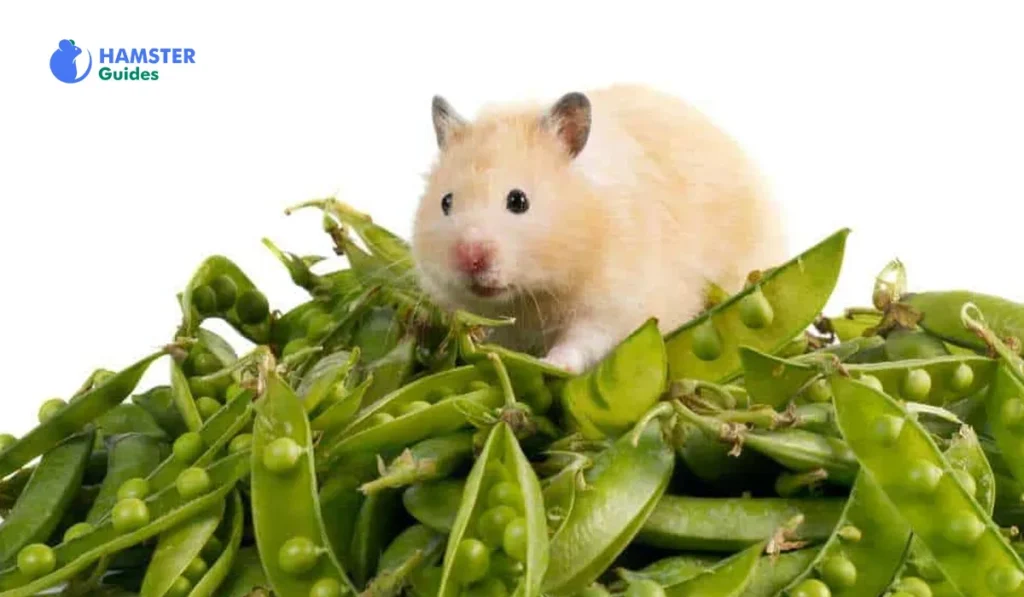
These green pods serve your hamster with vitamins C and K that improve their nutrition and feed their natural need to chew and munch. Alternative to providing an everyday meal, snow peas need to be seen as a little, rare snack.
Related Resource: Can Hamsters Eat Green Beans?
Nutritional Facts of Peas (Per 100g)
| Nutrient | Amount |
| Carbohydrates | 14.5 g |
| Sugars | 5.7 g |
| Protein | 5.4 g |
| Fat | 0.4 g |
| Dietary Fiber | 5.1 g |
| Cholesterol | 0 mg |
| Calories | 81 kcal |
| Iron | 1.5 mg |
| Water | 79 g |
| Phosphorus | 108 mg |
| Vitamin K | 24.8 µg |
| Vitamin B6 | 0.1 mg |
| Vitamin C | 40 mg |
| Acidity (pH) | 6.0 – 6.7 |
| Folate | 65 µg |
| Manganese | 0.3 mg |
Benefits of Peas for Hamsters
Although hamsters are naturally omnivores, peas are an important source of nutrients such as vitamins and minerals. Many health benefits can be obtained for your pet from these small green vegetables. Peas are rich in dietary fiber, which helps to maintain digestive tract health while improving regular bowel actions.
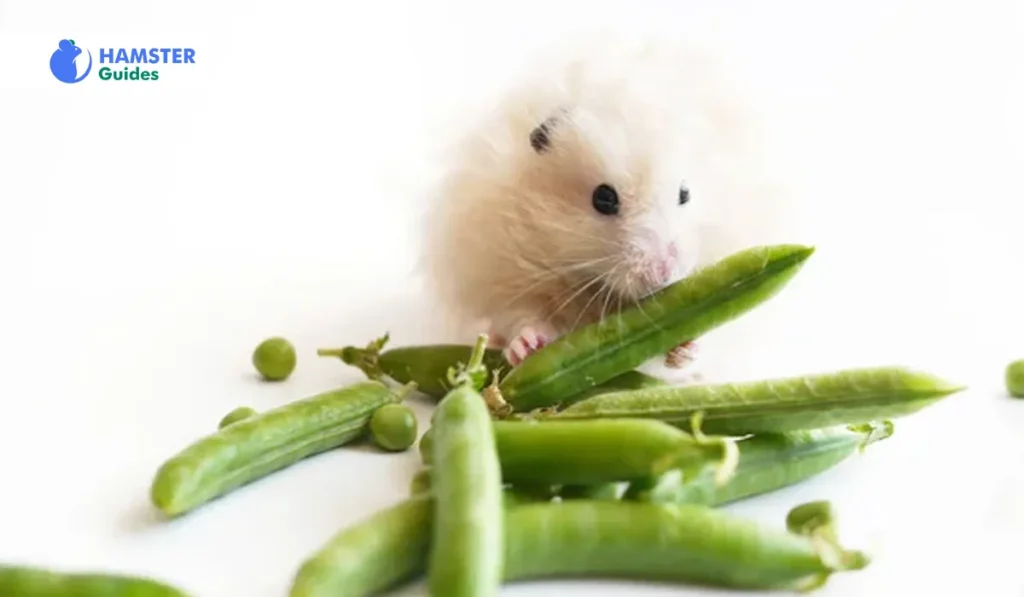
Peas contain manganese, enhancing bones and vital for little creatures like hamsters. Although vitamin B6 provides nourishment to the hamster’s skin, coat, and neurological system. The folate and iron in peas help maintain blood health. Additionally, peas contain an excellent protein level, which is necessary for hamsters’ growth and development of muscles.
Related Resorce: Can Hamsters Eat Bok Choy?
Considerations and Risks
You must use caution, while peas could benefit your hamster’s diet. Nutrition deficiencies could happen from eating hamsters, just peas. Therefore, portion control is important.
Although they include greater amounts of sugar compared to other foods. Peas could lead to diabetes in hamsters if they consume too much.
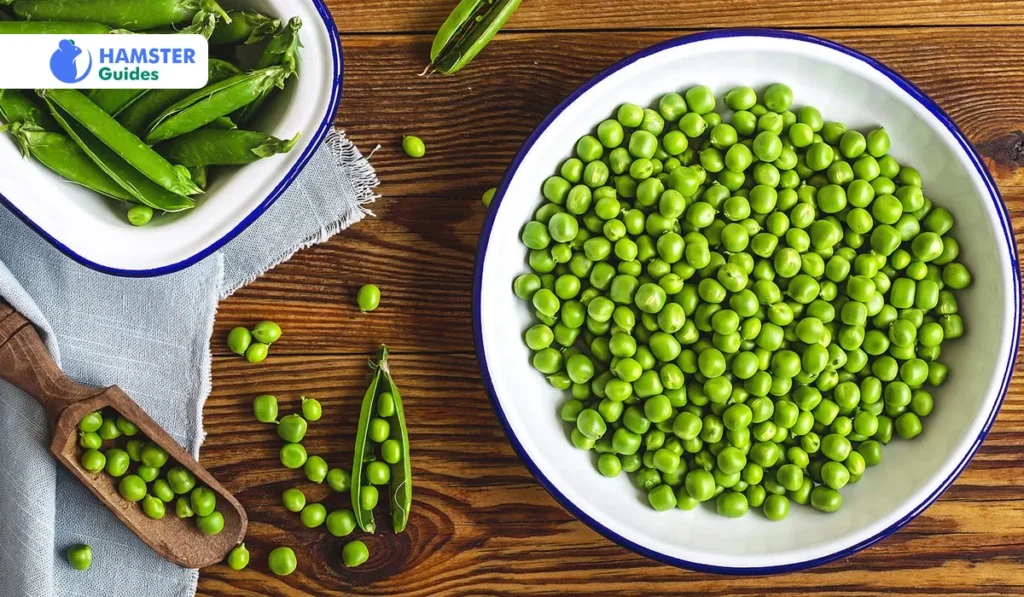
Furthermore, peas may be a choking hazard because of their size. Especially among tiny hamsters of different kinds like the Roborovski. Therefore, cutting peas in half is suggested before feeding them to your pet.
Related Resource: Can Hamsters Have Pickles?
Things to Consider
Additional information: Give a thorough wash to snow peas before being offered to your hamster.
Feeding Guide For Different Hamster Varieties
Peas aren’t healthy for all hamster breeds. Syrian hamsters may consume as many as 6 peas a week. Tiny hamsters, Roborovski hamsters, should consume just 3 peas a week.
Although smaller in size, kinds, such as Winter White and Campbell’s hamsters, can be more delicate, so avoiding offering them peas is preferable. It’s essential to consider your hamster breed’s dietary needs and size when choosing a well-balanced diet.
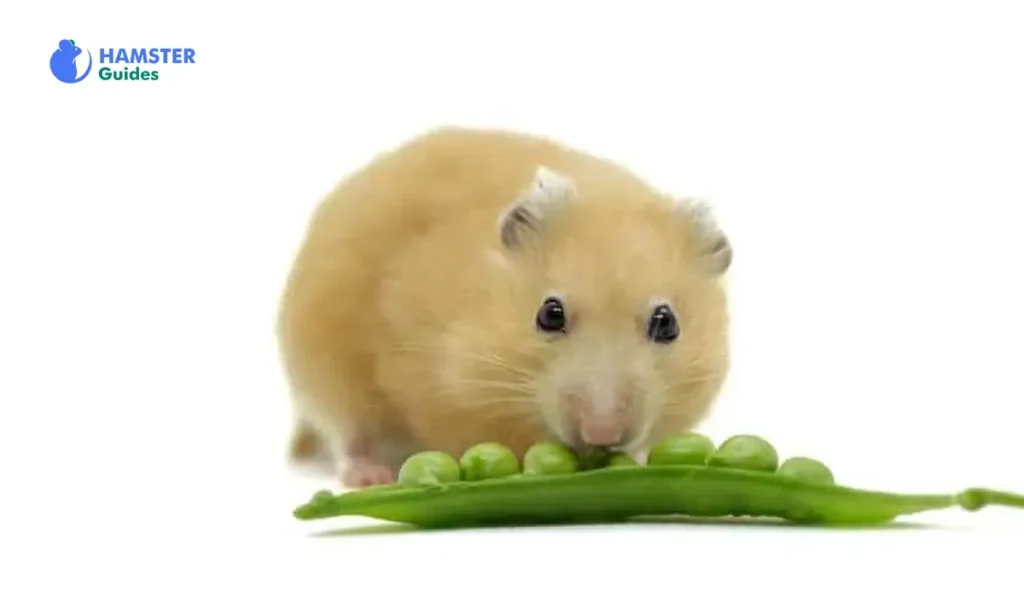
It is important to remember that hamsters are different from each other. There are several breeds of hamsters with unique digestive tracts and diets. Such as Syrian, Roborovski, Campbell’s, Chinese, and Winter Dwarf hamsters.
Therefore, it is important to visit a veterinarian to determine if snow peas satisfy your hamster’s nutritional requirements before providing them to your pet.
| Hamster Variety | Recommended Pea Intake |
| Campbell’s Hamsters | Not recommended; similar to Winter White hamsters. |
| Winter White Hamsters | Not recommended due to sensitivity. |
| Roborovski Hamsters | Up to 3 peas per week or 1 every other day. |
| Syrian Hamsters | Up to 6 peas per week or 2 every other day. |
| Other Dwarf Hamsters | Generally not recommended due to difficulty in nutrition balancing. |
Additional informational: Choking danger may decrease by removing the pod shell.
How to Introduce Snow Peas to Your Hamster
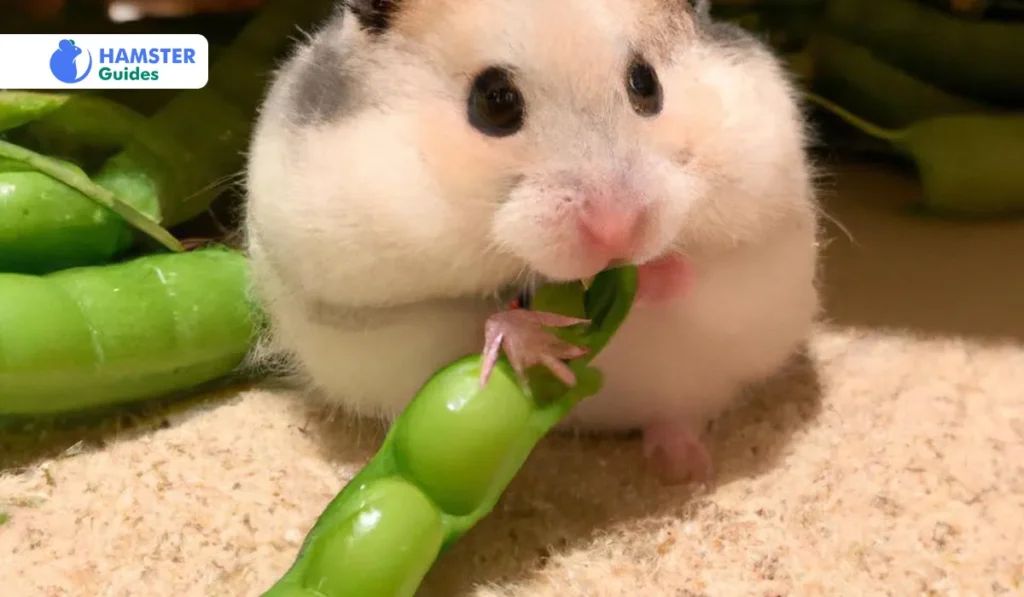
It’s crucial to add snow peas to your hamster’s diet gradually. To make sure of a smooth transition, do the following steps:
Offer a Small Piece: Start by providing your hamster with a tiny bit of snow peas as an incentive. Before adding it to their normal diet, check how they react and feel hungry.
Monitor for Digestive Issues: Observe your hamster for any signs of gastrointestinal problems. Like bloating or diarrhea after a snow pea meal. Whenever your pet develops unwanted responses, stop providing them to them.
Include Snow Peas in Moderation: Snow peas are a beneficial addition to your hamster’s diet. However, they shouldn’t be used in the place of their main food source. To prevent overfeeding, provide snow peas as an occasional treat.
Related Resource: Can Hamsters Eat Pomegranate?
Preparation and Alternatives
It is important to ensure cleanliness before offering them peas. To get rid of any germs or chemicals, thoroughly wash your peas. You should cut peas in half to prevent choking difficulties.
Give unsalted and unseasoned peas to hamsters. Do not give your eating leftovers to them. If your hamster isn’t interested in peas, consider broccoli spears, carrot tops, cauliflower, and cabbage as vegetable replacements.
Provide your hamster with a balanced diet. This includes excellent commercial hamster feed and a small quantity of appropriate vegetables. For example, spinach, broccoli florets, and romaine lettuce.
The Final Words
Usually served in small amounts. Snow peas could be a healthy addition to a hamster’s diet. They provide necessary nutrients like fiber and vitamins. However, taking excessive amounts of them can lead to diseases.
That affects your hamster’s weight, immunity, and other essential functions. For the safety and well-being of your hamster, take precautions and get help from a veterinarian if you plan to give them snow peas.









Leave a Reply